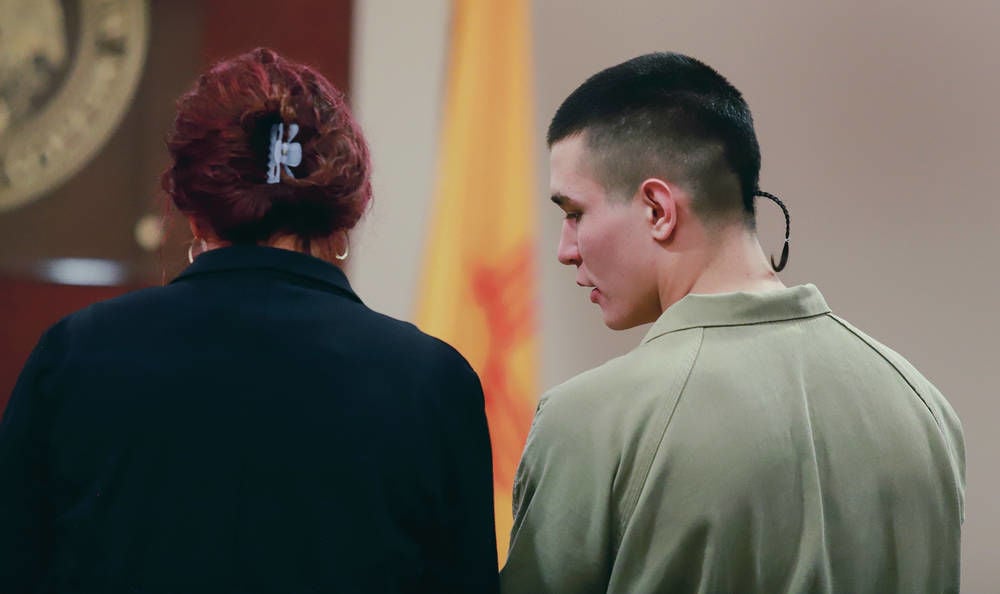
Charles Galvan, 44, and his son, Carlito Quintana Speas, 23, reached plea agreements of no contest Monday to charges related to the rape of a 15-year-old girl at a fiesta party in 2015. Photos by Gabriela Campos/The New Mexican
A father and son accused of jointly raping a 15-year-old girl at a Fiesta de Santa Fe party in 2015 pleaded no contest Monday to conspiring to sexually assault the girl and threatening to harm her if she went to police.
The plea was part of an agreement with the District Attorney’s Office that calls for both men to be placed on probation.
Prosecutors dismissed eight counts of criminal sexual penetration and two counts of criminal sexual contact against 44-year-old Charles Galvan and six counts of criminal sexual penetration against his 23-year-old son, Carlito Quintana Speas.
District Judge T. Glenn Ellington sentenced Galvan to three years probation after accepting his plea. He sentenced Quintana Speas, who has been serving time on a federal bank robbery conviction while this case was pending, to five years probation.
The charges to which the men entered pleas exposed each to as many as six years in prison, but their suspended sentences in favor of probation were part of the deal agreed to by prosecutors.
The state also agreed not to apply a one-year habitual offender enhancement against Galvan, who was convicted in the past of heroin trafficking, child abuse and aggravated fleeing of a police officer.
The two men were charged with raping the girl, who does not live in New Mexico, after she told school officials that during a visit to Santa Fe in September 2015 she had encountered Quintana at a party where she took part in using drugs and drinking, then went with him to the home of one of his relatives, where Quintana Speas shared a room with his father.
The girl said she and Quintana Speas got in bed and were joined by Galvan, after which the two men sexually assaulted her.
The girl told the men on several occasions to stop, according to an arrest affidavit. Police say the men later threatened to kill her if she told anyone about the incident. The teenager told family members about the incident during the ensuing days and months but it wasn’t until March 2016, after she told authorities at her school about the incident, that the matter was reported to Santa Fe police.
Ellington said when sentencing the men Monday that the state was “getting as much as it can” in the case, which he said had been “a mess since the beginning,” with many discovery issues and the state having difficulty even arranging for the defendants to be brought to court hearings.
Asked by the judge why the deal was a good one for the state, Assistant District Attorney Martin Maxwell said the accuser has a high risk pregnancy and was concerned about having to testify at trial.
Maxwell said the state was also concerned about the age of the case. It had been pending for more than three years and Quintana Speas had filed a motion to dismiss for lack of a speedy trial.
Asked to comment following the hearing, District Attorney Marco Serna said in an email: “We must always remember that victims of sexual assault and violence endure unimaginable pain and anguish and… may not want to participate in the prosecution process.
Although we have had constant communication with the victim’s family, we have recently lost contact with the victim who showed indications of hesitation in November of last year. Rather than gamble on the small chance we’d be able to find the victim to testify, we ensured that these two individuals are convicted felons.”
When the men were asked if they wanted to say anything in court Monday, Quintana Speas declined, but Galvan spoke.
“I’m already almost 45 and I’ve never been convicted of no violent crime,” Galvan said, adding he was not a danger to the community and that, if he was, he already would have been convicted of a violent crime by now.
“This is an unlucky and unfortunate situation… let’s leave it at that,” Galvan said.
Ellington responded that Galvan was “hardly a model citizen.”
“I’ve had to revoke your conditions of release on a couple of occasions,” Ellington said, adding that Galvan had been charged with “many violent things” in the past but was simply lucky he’d never been convicted of them.
The judge said the state was in “an untenable position” trying to prosecute this case with its many evidence problems including intimidation of the witness which, the judge said, he couldn’t be sure hadn’t continued while the case was pending.


